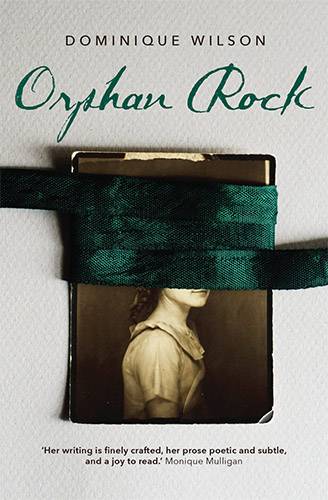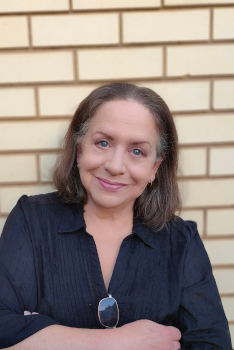Orphan Rock Interview

Orphan Rock is a complex and richly detailed story of secrets and heartbreak that will take you from the back streets of Sydney's slums to the wide avenues of the City of Lights.
The late 1800s was a time when women were meant to know their place. But when Bessie starts to work for Louisa Lawson at The Dawn, she comes to realise there's more to a woman's place than servitude to a husband.
Years later her daughter Kathleen flees to Paris to escape a secret she cannot accept. But World War One intervenes, exposing her to both the best and the worst of humanity.
Masterful and epic, this book is both a splendid evocation of early Sydney, and a truly powerful story about how women and minorities fought against being silenced.
About the author
Dominique Wilson was born of French parents in Algiers, Algeria. She grew up in a country torn by civil war, until she and her family fled to Australia. She was founding Managing Editor of Wet Ink: the magazine of new writing, and Chair of the Adelaide branch of International PEN. Dominique's short stories have been published nationally and read on ABC Radio, and one of her short stories was made into a film. Her debut novel The Yellow Papers [Transit Lounge, 2014] and her second novel That Devil's Madness [Transit Lounge, 2016] were both published to critical acclaim.
Orphan Rock
By Dominique Wilson
Transit Lounge
RRP: $32.99
Interview with Dominique Wilson
Question: What originally inspired the idea of Orphan Rock?
Dominique Wilson: My previous novel, That Devil's Madness [about the Algerian War of Independence, set mostly in North Africa] had just been released, when Barry Scott, my publisher at Transit Lounge, commented that it would be good if my next novel was set mostly in Australia. I'd just read the biography of Louisa Lawson [Henry Lawson's mother], and I really liked the way she had gone against the norms of the time, hiring only women for her press, and the clever way she had managed to overcome the Typographical Association of New South Wales's attempt to impose a boycott on her journal, The Dawn, who used the excuse that such work was detrimental to women's health. I thought a novel set around that time – Sydney in the late 1800s, early 1900s – might make an interesting story.
Question: What did you learn, about yourself, whilst writing Orphan Rock?
Dominique Wilson: Part of my research was focused on the social norms – the unwritten rules of beliefs, attitudes, and behaviours that were considered acceptable in Sydney at that particular time. Rules that told men and women how to behave, so as to provide order in society, and what happened when people dared to go against those social norms. And what struck me was how little anything has changed, and how my own reaction to certain rules and regulations echoed those of women who lived more than a hundred years ago.
Question: How much of your inspiration comes from real life and real people?
 Dominique Wilson: One of the interesting things about researching a particular time in history, is that there were people alive then who may now be recognised as historically important, but who at that time were just ordinary people going about their lives the best way they knew how. When I find such people, I like to include them in my novels, if suitable. So for Orphan Rock, there is Louisa Lawson who ran a printing press, Quong Tart, a Chinese man who spoke English with a Scottish accent, who opened Sydney's first tea-rooms, and became one of Sydney's most loved and respected characters amongst all classes, right in the middle of a time when workers were agitating against Chinese labour and the White Australia Policy was being drawn up. Some years later, you have Tilley Devine and Kate Lee and their razor-gangs, warring over their territories in the streets of Sydney. And in Paris, where some of Orphan Rock is set, you have Paul Poiret, at the time just a young man haunting avant-guard art exhibitions for inspiration, whilst dreaming of becoming a fashion designer.
Dominique Wilson: One of the interesting things about researching a particular time in history, is that there were people alive then who may now be recognised as historically important, but who at that time were just ordinary people going about their lives the best way they knew how. When I find such people, I like to include them in my novels, if suitable. So for Orphan Rock, there is Louisa Lawson who ran a printing press, Quong Tart, a Chinese man who spoke English with a Scottish accent, who opened Sydney's first tea-rooms, and became one of Sydney's most loved and respected characters amongst all classes, right in the middle of a time when workers were agitating against Chinese labour and the White Australia Policy was being drawn up. Some years later, you have Tilley Devine and Kate Lee and their razor-gangs, warring over their territories in the streets of Sydney. And in Paris, where some of Orphan Rock is set, you have Paul Poiret, at the time just a young man haunting avant-guard art exhibitions for inspiration, whilst dreaming of becoming a fashion designer. Question: Is there a message you hope readers take from Orphan Rock?
Dominique Wilson: I never set out to send a message as such – I simply hope to tell a story that will entertain readers. Having said that, I do realise that by creating characters who struggle to achieve something, the story will say something about their values and beliefs, which will result in 'messages' slipping into the story. But then, I often look at opposing sides of an issue as well, so these 'messages' can often contradict each other – a good thing, I think, because it is then up to the reader to decide which 'message' they want to take from reading that particular book, assuming they want to take a message from it at all. With Orphan Rock, I hope people are able to relate in some ways to Bessie, Lottie and Kathleen, because the struggles these women went through are struggles women are still experiencing today. Also how much we can learn from history – while researching the Spanish Flu pandemic that happened at the end of WWI, I was amazed at the similarities between it and the COVID-19 pandemic. So much so that I wrote about these on my blog. Spanish philosopher George Santayana is credited with saying, 'Those who cannot remember the past are condemned to repeat it'. I think that's very true.
Question: What research did you do, prior to writing Orphan Rock?
Dominique Wilson: A mountain of research! The obvious ones were the history of Sydney and Paris across decades, maps of those cities and how they changed over these decades, the way people dressed, did their hair, what they ate and so on, modes of transport over time and how long it would take to get from point A to point B by walking, or in a horse and cart, or a tram, and so on. Then there were the biographies of people who actually lived then, that I wanted to include in the book, as well as perhaps less obvious things like the social norms of the time mentioned above, signs and symptoms of various illnesses, the workings of a telegraph office in the late 1800s, the floorplan of a typical boarding house in Paris, or a 'two-up-two-down' in Sydney and so on. So yes, a lot of research!
Question: What advice do you have for aspiring writers or artists?
Dominique Wilson: Read in the genre you want to write, and in other genres as well – they all have something to teach you. Or visit art galleries and exhibitions, even if not the type of art you want to create. Write [or create] – don't wait for the muse, she may never come. And allow yourself to daydream, to just stare off into space – that's part of the creative process too!
Question: What or who inspired your love of reading/writing?
Dominique Wilson: I think my love of story – whether read, written or listened to – came from my grandfather, when I was a little girl. He had these two huge artbooks, where each page was an image of a famous painting. In the evenings, he would sit me on his lap and, together, we would turn the pages, and for every painting, we would make up a story about it.
Question: What's next, for you?
Dominique Wilson: I've just spent the last year researching my next book, and have only just started writing it. Where exactly to start is always a bit of an issue for me – so far, I've written three possible beginnings, at different stages of my protagonist's life. But I think I've finally found the right one!
Interview by Gwen van Montfort
MORE



